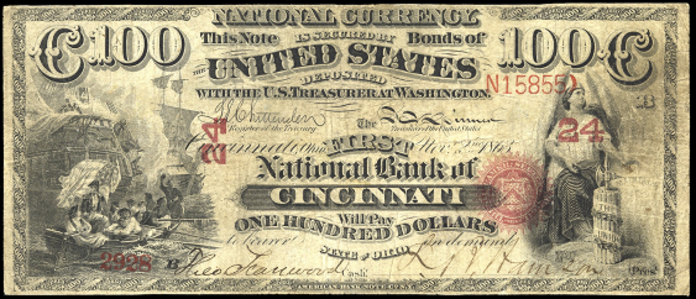One Hundred Dollar Notes › Nationals › 1863 One Hundred Dollar Original Series National Bank Notes › Indiana Charters › 1863 $100 Indianapolis Indiana First National Bank
Get Value Now
| Item | Info |
|---|---|
| Series | 1863 |
| Charter | #55 First National Bank of Indianapolis, Indiana |
| Year Chartered | 1863, 179 Banks Chartered |
| City Info | Indianapolis, is the capital and largest city of the U.S. state of Indiana and the seat of Marion County. It is in the East North Central region of the Midwestern United States. With an estimated population of 855,164 in 2016, Indianapolis is the second most populous city in the Midwest and 15th most populous in the U.S. The city is the economic and cultural center of the Indianapolis metropolitan area, home to 2 million people, the 34th most populous metropolitan statistical area in the U.S. Its combined statistical area ranks 27th, with 2.38 million inhabitants. Indianapolis covers 372 sq mi, making it the 16th largest city by land area in the U.S. Source: Wikipedia |
| Similar Cities | If your note doesn't match try: 1. Indianapolis, Indiana - Indianapolis National Bank 2. Indianapolis, Indiana - Citizens National Bank 3. Indianapolis, Indiana - Fourth National Bank 4. Indianapolis, Indiana - Merchants National Bank 5. Indianapolis, Indiana - Indiana National Bank 6. Indianapolis, Indiana - Meridian National Bank |
| Seal Varieties | Red with rays |
| See Also | If your note doesn't match try: 1. 1863 $100 Compound Interest Treasury Note 2. 1864 $100 Compound Interest Treasury Note 3. 1863 $100 Gold Certificate 4. 1861 $100 Interest Bearing Note 5. 1863 $100 Interest Bearing Note 6. 1864 $100 Interest Bearing Note |
| Other Info | 1. Value depends on notes known for charter, condition and market demand. |
| Neat Fact | Engraved date is when bank was organized, a 20 or 40 year anniverary of its organization, or date of title change (Kelly, 5th Ed. P 5 & Huntoon 1995). |
No Obligations Offers and Appraisals
Please submit a good photo or scan. It will be identified and evaluated. Understand there may be subtle differences between the image you see above and your note. Signatures, design, markings and note condition will determine the offer price. Notes in Uncirculated or better condition receive the best offers.
Appraisals can be estimated for wholesale and retail prices. Wholesale is what dealers typically pay. Retail is what a collector might pay. Retail is slightly higher in most cases.
Please visit this page for USA Paper Money Reference. Do not treat this page as a reference guide, it is for appraisal and acquisition purposes only.
